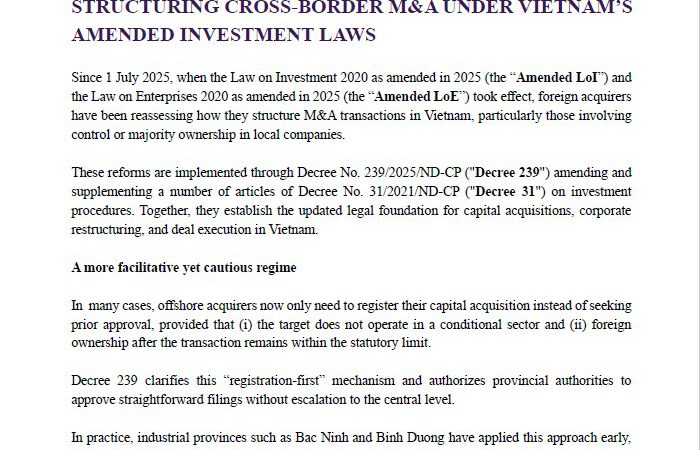
Insight Alert: Structuring Cross-Border M&A Under Vietnam’s Amended Investment Laws
Since 1 July 2025, when the Law on Investment 2020 as amended in 2025 (the “Amended LoI”) and the Law on Enterprises 2020 as amended in 2025 (the “Amended LoE”) took effect, foreign acquirers have been reassessing how they structure M&A transactions in Vietnam, particularly those involving control or majority ownership in local companies.
These reforms are implemented through Decree No. 239/2025/ND-CP (“Decree 239“) amending and supplementing a number of articles of Decree No. 31/2021/ND-CP (“Decree 31“) on investment procedures. Together, they establish the updated legal foundation for capital acquisitions, corporate restructuring, and deal execution in Vietnam.
A more facilitative yet cautious regime
In many cases, offshore acquirers now only need to register their capital acquisition instead of seeking prior approval, provided that (i) the target does not operate in a conditional sector and (ii) foreign ownership after the transaction remains within the statutory limit.
Decree 239 clarifies this “registration-first” mechanism and authorizes provincial authorities to approve straightforward filings without escalation to the central level.
In practice, industrial provinces such as Bac Ninh and Binh Duong have applied this approach early, issuing local guidance that noticeably shortens processing time. Other provinces remain more cautious, still consulting the central ministry for sensitive cases, showing that transaction certainty depends as much on provincial implementation as on the statutory text itself.
From our recent practice
In our experience, foreign investors have adjusted not only to the procedural reforms but also to how transactions are structured under the new framework, especially in sectors involving land use rights, manufacturing, or high-value assets. This evolution has given rise to several common structuring models observed in cross-border M&A transactions in 2025.
Before examining each model, it is worth noting that these structures reflect both the statutory conditions under the amended laws and the practical realities of regulatory approval in different provinces. They represent how foreign investors are balancing compliance, control, and timing within Vietnam’s evolving investment landscape.
Structuring models foreign acquirers are using in 2025
1. Offshore SPV → Vietnam OpCo
In our experience, this remains the dominant structure for cross-border buyers seeking tax efficiency and financing flexibility via Singapore or Hong Kong SPVs.
The Amended LoI streamlines registration but requires each target to be reviewed against the updated Market Access Schedule attached to the law.
2. Vietnam HoldCo
An increasing number of strategic acquirers are forming a Vietnamese holding company to consolidate equity across multiple projects. This structure allows on-shore refinancing, dividend repatriation, and potential domestic listing. The Amended LoE enhances minority shareholder protection and transparency, making this model safer for long-term investors.
3. Asset / Land-Right Separation
Driven by the Land Law 2024, foreign buyers increasingly separate the entity holding land use rights from the operating entity (“OpCo”). This complies with land restrictions while preserving control and expediting approvals, especially in real-estate-linked M&A deals.
Three key issues foreign buyers should watch in practice
1. Foreign-ownership calculation
Interpretation of indirect foreign ownership remains inconsistent among provinces, as also reflected in the UNCTAD Vietnam Investment Policy Review 2024 and the FDI Forum 2024. Some authorities
consider only direct shareholding, while others include intermediate offshore layers where control or voting rights are exercised.
2. Sequence of filings
For cross-border acquisitions in licensed sectors such as education, fintech-adjacent services, or data processing, the order between enterprise registration and sectoral license update remains critical under Decree No. 01/2021/ND-CP and Decree 31. Misalignment often causes delays or requests for clarification.
3. Document consistency
Buy-side counsel should ensure that the Share Purchase Agreement, company charter, and filing dossiers are fully aligned. Even minor discrepancies in share ratios or voting thresholds may trigger resubmission.
According to the recent data published by National Statistics Office of Vietnam, Vietnam attracted a total of 28.54 billion USD in foreign direct investment between January and September 2025, making a 15.2% increase compared to the same period last year. This trend indicates growing investor confidence in Vietnam’s regulatory environment, though uneven implementation still makes execution strategy critical.
Our recommendation
For foreign acquirers, a compliance-first and province-aware execution model remains the most reliable path to closing. Practical success in Vietnam often depends less on deal complexity and more on how clearly the structure is presented to licensing authorities. Well-documented compliance, transparent filings, and clear governance terms consistently shorten approval time and reduce regulatory risks.
Author
Le Nguyen Huy Thuy, Partner, Lac Duy & Associates (LDA)
Profile: https://lacduy-associates.com/luat-su-thanh-vien/le-nguyen-huy-thuy/
Website: https://lacduy-associates.com
Address: Room 603, 6th Floor, Centec Tower, 72–74 Nguyen Thi Minh Khai Street, Xuan Hoa Ward, Ho Chi Minh City
Tel: +84 918 00 22 90
Disclaimer
This Insight Alert is for general informational purposes only and should not be construed as legal advice. For specific guidance tailored to your situation, please contact Lac Duy & Associates.

